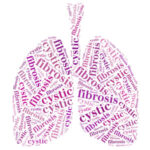
What is TrikaftaTM?
Trikafta is a “triple-combination therapy” made of three different modulator drugs- tezacaftor, ivacaftor, and elexacaftor. Modulators work by helping to fix defective CFTR protein. Trikafta may be much more effective than other available modulators, such as Symdeko® or Orkambi®.
What are the benefits of TrikaftaTM?
Clinical trials of Trikafta showed large improvements in people with CF. People with one copy of the F508del genetic mutation saw their lung function increase by more than 14 percent compared to people taking a placebo, or sugar pill. For people with two copies of the F508del mutation, lung function increased 10 percent compared to people taking another modulator, tezacaftor/ivacaftor (Symdeko®). People in the clinical trials also saw big increases in their quality of life and their sweat chloride levels. Many people taking Trikafta will also have improvements in gastrointestinal (GI) issues. Trikafta will probably not fix damage that has already occurred in the lungs and other organs (such as the pancreas).
Who can take TrikaftaTM?
Trikafta has been approved for people with CF ages 12 years and older who have at least one copy of the F508del mutation. It does not matter what your second mutation is.
Is TrikaftaTM safe? What are the risks or side effects?
Trikafta was shown to be safe and may have fewer negative side effects than previous modulators. Trikafta may cause issues with your liver, so you must get blood tests to monitor your liver function every 3 months for the first year you take the drug. There is also an increased risk of cataracts (an issue with your vision) in people under 18 years old, so you will need an eye exam every year.
Certain drugs may interact with Trikafta, including some antifungal medicines and some antibiotics. You should not take Trikafta if you are on certain antibiotics (rifampin or rifabutin), specific seizure medications, or St. John’s Wort. Talk to your doctor about all your current medications before taking Trikafta.
Can I stop my other CF medications or therapies?
People with CF who take Trikafta will probably still need other daily treatments to manage their symptoms. You should discuss things with your CF team before making any changes to your medications or treatments.
Does TrikaftaTM have any effect on female sexual and reproductive health?
We do not completely know the effects of Trikafta on reproduction.
As with other modulator drugs, Trikafta may increase female fertility because it thins out cervical mucus (link to fertility guide). We do not know the effects of taking Trikafta if you are pregnant, either for you or for the developing baby. Also unknown is how much Trikafta passes into breastmilk and its risks for nursing babies.
Trikafta is NOT expected to decrease the effectiveness of contraception, including forms of hormonal contraception like the birth control pill.
Some people who take Trikafta have developed rashes and many of these people are women taking the birth control pill. If you develop a rash while taking Trikafta, you should talk to your CF team. If you are on the pill, you may want to discuss with them about changing the kind of birth control you take.
If you think you are pregnant or want to become pregnant and are taking Trikafta, it’s very important to tell your CF team as soon as possible. Your CF team will help you figure out any changes to your medications and therapies that may be required. They can confirm pregnancy through a pregnancy test and help you figure out the best decision based on your needs and your health. It’s important to know that you have many options.
Our health guides are developed through a systematic, rigorous process to ensure accuracy, reliability, and trustworthiness. Written and reviewed by experienced healthcare clinicians from Boston Children's Hospital, a Harvard Medical School teaching hospital and consistently ranked as a top hospital by Newsweek and U.S. News & World Report, these guides combine clinical expertise, specialized knowledge, and evidence-based medicine. We also incorporate research and best practices from authoritative sources such as the CDC, NIH, PubMed, top medical journals, and UpToDate.com. Clinical specialists and subject matter experts review and edit each guide, reinforcing our commitment to high-quality, factual, scientifically accurate health information for young people.